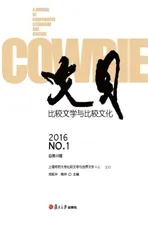Note from the Editor-in-Chief
2016-11-14YunhuaLiu
Yunhua Liu
Note from the Editor-in-Chief
Yunhua Liu
In this issue we are very pleased to highlight two outstanding papers by Professors Qian Linsen and Zhou Ning, respectively. Qian and Zhou are both committed to understanding the complex matrix of factors involved in Chinese and Western literary exchange. In their papers, they recognize the importance of collecting and analyzing historical sources for understanding cross-cultural literary communication. But they also incorporate an attention to the values and emotions underlying those sources, and the way they are active in stimulating the mutually constitutive processes of imagination and creation at the heart of cultural exchange. As such, their papers enrich and expand our knowledge of the relationship between self and the other.
In addition, this issue also includes the insightful paper “Understanding the Aesthetic of the ‘Trivial’: The Great Music of Dao in the Subtle Melody of Function Words”, in which Professor Chen Shudong focuses on the indispensable but often overlooked role of function words (功能词) or xuci (虚词). He argues that classical works regularly utilize function words, which he characterizes as “an aesthetic of the trivial”. Readers will also f nd much food for thought in Yang Junjie’s article,“Tschen Ki-tong and Wilhelm Schott: On the Chinese Translation of ‘Reszket a bokor, mert’ ”, which details the translation process of the influential Hungarian poet’s well-known poem from 1880. In his paper, Dr. Yang displays his enviable ability of reading and analyzing the nuanced movement between languages in translation. This issue also includes my paper, “Meaning-Making inYi-Zhuan
(〈易传〉)”, in which I focus on the interpretation of perspective and objects and the role they play in generating cohesive meaning in the text.Finally, we are pleased to include 14 letters from two prominent scholars of Comparative Literature in China, Jia Zhifang and Yue Daiyun, written to their colleague, Professor Sun Jingyao. This year coincided with the 100anniversary of Professor Jia’s birth, and we publish these letters in remembrance of him. The letters are important for they illustrate the difficulties encountered by the predecessors in our f eld; they also illustrate the dedication and depth of character of Professors Jia and Yue. Indeed, Professor Jia is one of a handful scholars in our f eld who is admired as much for his character as his scholarship; I recall Professor Sun, my supervisor, frequently mentioning Jia as an example of the best in our f eld. Moreover, I experienced Jia’s generosity as a junior scholar. After presiding over my master’s thesis defense (25 years ago), he approached me and said that he would “like to be friends.” At the time I didn’t understand the signif cance of his sentiments; it was not until many years later that I came to realize that Professor Jia, through his transparent sincerity, sought to mentor, promote, and support junior faculty. This sentiment will become apparent to readers as they peruse the letters published here. Similarly, Professor Yue is highly esteemed in our f eld; I had the honor of being one of her students, through which I cherished the opportunity to learn from her optimism, compassion, and breadth of mind. By publishing their letters, we hope to express our deepest respect and admiration of these three pioneers of comparative literature in China.
(Translated by Yanyan Deng; edited by Julie Starr)
